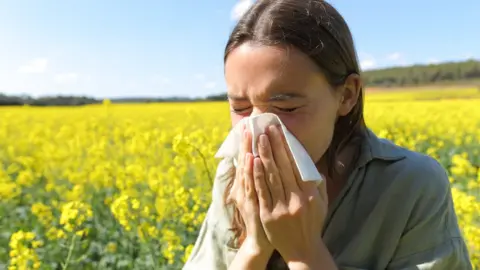Hay-fever pill shortage hits High Street chemists
 Getty Images
Getty ImagesHigh Street chemists have run out of some hay-fever medicine, as a UK industry-wide shortage hits supplies.
Stocks of chlorphenamine maleate, the active ingredient in brands such as Piriton, are limited, Boots says.
The chain said it still had a large range of other hay-fever medicines in stores and online.
Pollen counts will remain medium to high across much of the UK this week, the Met Office says.
A Boots official said: "There are a very small number of lines that are currently out of stock due to a current, industry-wide shortage of the active ingredient.
"However, we are expecting this to be resolved soon and new deliveries are expected in the coming weeks."
Boots says it has over 90 hay fever relief products - four are impacted by the shortage.
Staying indoors
Some hay-fever medication, including chlorphenamine, can cause drowsiness.
Those affected should avoid driving, riding a bike and using tools or machinery.
As well as a variety of pills, shops sell nasal sprays and eye drops that can relieve symptoms, such as itchy eyes and runny nose.
The NHS also suggests:
- Vaseline around the nostrils, to trap pollen
- wraparound sunglasses, to prevent pollen reaching the eyes
- staying indoors with windows and doors shut
- showering and changing clothes after going outside
Medicine shortages are not new and can be due to manufacturing issues, global demand or disruption with the supply chain. Royal Pharmaceutical Society president Claire Anderson said pharmacists and pharmacy teams were used to managing and dealing with them.
At the end of April, the government appointed a hormone-replacement therapy (HRT) tsar to tackle drug shortages affecting products used by about a million women in the UK to treat menopause symptoms.
Hay fever, also known as allergic rhinitis, affects almost 10 million people in England, of all ages. That's almost one in four adults and one in 10 children.
It is caused by an allergic response to allergens, such as pollen. Some people are triggered by tree pollen - typically around March to mid-May - and others by grass or weed pollen which come slightly later in the season.
When this happens, the body makes a chemical called histamine.
Drugs called antihistamines - chlorphenamine is an antihistamine - can help with the symptoms.
Some of the symptoms of hay fever overlap with those of Covid.
If you think you may have a respiratory infection, such as Covid, try to avoid contact with other people, especially those at higher risk of becoming seriously unwell.
